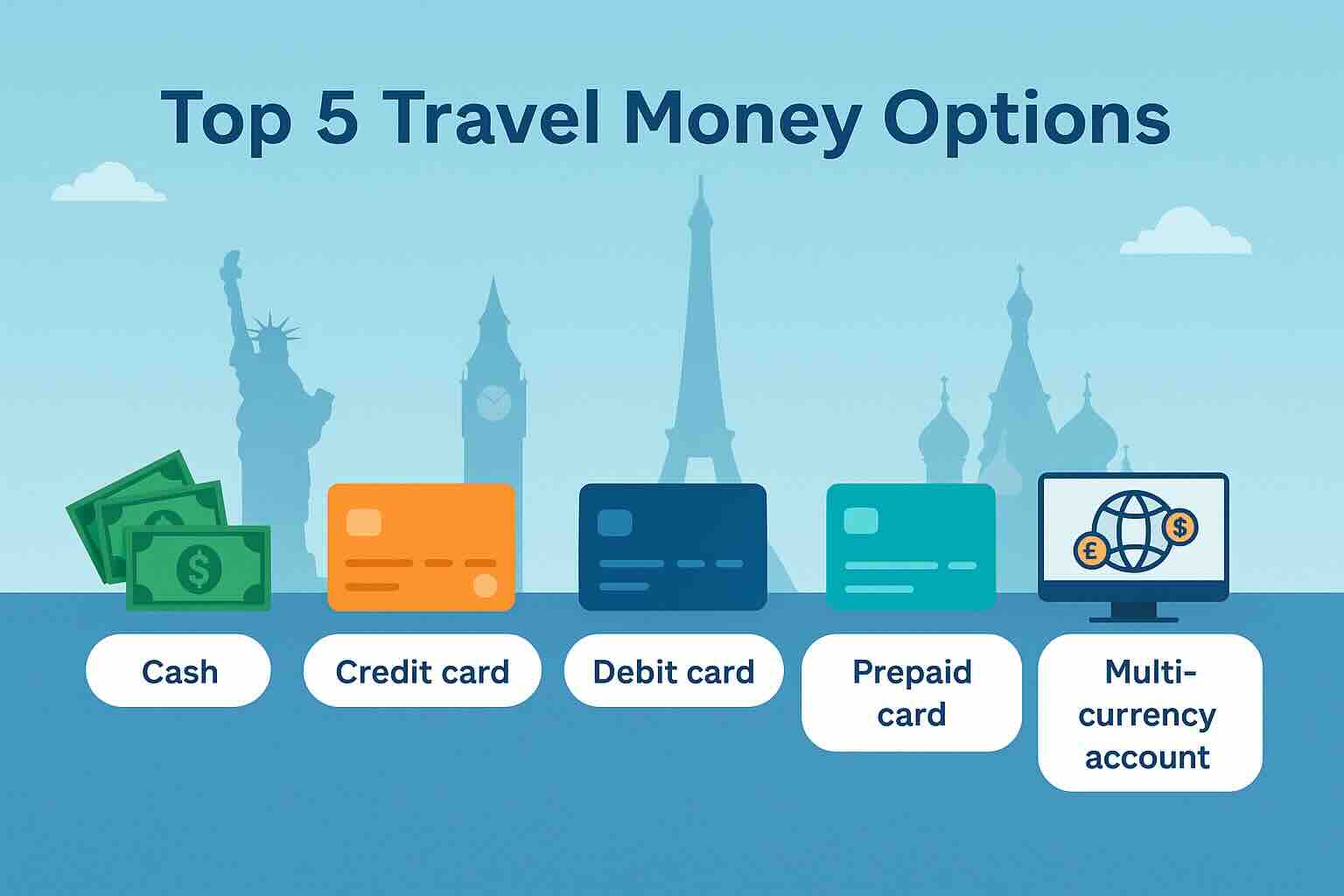✈️ Top 5 Travel Money Options: Best Ways to Spend Abroad in 2025
Looking for the best travel money options for your next international trip? Whether you’re heading overseas for vacation, work, or study, choosing the right way to access and spend your money abroad is key to avoiding hidden fees and poor exchange rates.

In this guide, we cover the top 5 travel money options, highlighting their pros, cons, and tips to help you get the best value.
1. 💳 Multi-Currency Travel Cards
What it is: Prepaid debit cards that let you load and spend in multiple currencies.
Pros:
• Lock in exchange rates before you travel
• Safer than cash, with PIN protection
• Accepted worldwide (Visa/Mastercard networks)
• Manage via mobile apps
Cons:
• Some cards have reload, ATM, and inactivity fees
• Not ideal if you frequently change destinations with unsupported currencies
👉 Popular options: Wise Travel Card, Revolut, Travelex Money Card.
⸻
2. 💵 Foreign Cash
What it is: Physical currency you buy before your trip.
Pros:
• Useful in cash-only destinations (markets, taxis, etc.)
• No ATM or card fees
Cons:
• Risk of theft or loss
• Poor exchange rates at airports and tourist areas
Top Tip: Always buy cash in advance from reputable providers or order online for better rates.
⸻
️3. 🏦 International Bank Cards (Credit/Debit)
What it is: Your regular credit or debit card used overseas.
Pros:
• Easy and convenient
• Some premium cards offer no foreign transaction fees
• Great for large purchases and hotel bookings
Cons:
• Foreign transaction fees (typically 2%–4%)
• Dynamic currency conversion traps (always pay in local currency)
Best Practice: Choose cards with low FX fees and always decline dynamic currency conversion.
Where are you travelling?
️4. 🏧 ATM Withdrawals Abroad
What it is: Using ATMs in your destination to withdraw local currency.
Pros:
• Often offers competitive exchange rates
• Convenient and widely available
Cons:
• Foreign ATM fees + your bank’s withdrawal fees
• Daily withdrawal limits
💡 Tip: Withdraw larger sums less frequently to minimize per-use fees.
⸻
5. 🌐 Digital & Mobile Wallets
What it is: Apps like PayPal, Apple Pay, and Google Pay linked to your bank account or card.
Pros:
• Contactless & secure
• Great for online purchases and some in-store payments
• Quick setup & easy to use
Cons:
• Limited acceptance in some countries
• May involve FX fees or poor exchange rates
Good For: Tech-savvy travelers and online shopping during trips.
⸻
🛫 How to Choose the Best Travel Money Option
• ✅ Compare exchange rates and fees: Use our Travel Money Comparison Tool ➔
• ✅ Check card/app acceptance in your destination
• ✅ Consider safety and convenience: Multi-currency cards and digital wallets are safer than carrying large amounts of cash.
• ✅ Mix & match: A combination of travel card + small amount of foreign cash often works best.
⸻
👉 Start Comparing Travel Money Options Now ➔
Whichever option you decide is best for your particular adventure, it's also a very good idea to compare exchange rates so that you optimise on how much travel money you take with you. See our comparison table below:
##💡 Quick Takeaway:
• Best Overall: Multi-currency cards for flexibility & safety
• Best for Simplicity: Bank cards + digital wallets
• Best Backup: Small amount of foreign cash + ATM access
| Travel Money Option | Pros | Cons | Best For |
|---|---|---|---|
| Multi-Currency Travel Cards | Lock in exchange rates, Safer than cash, ATM access, App control | Reload/ATM fees, Not all currencies supported | Travelers wanting budget control & security |
| Foreign Cash | Widely accepted, No ATM fees, Essential for cash-only spots | Risk of theft, Poor rates at airports, No protection if lost | Short trips, rural areas, cash-based economies |
| Bank Credit/Debit Cards | Convenient, Great for big purchases, Rewards & protections | FX fees (2–4%), Risk of DCC fees, Possible foreign ATM fees | Larger expenses, hotel bookings, emergencies |
| ATM Withdrawals Abroad | Competitive rates, Convenient access to local cash | Foreign ATM & bank fees, Withdrawal limits | Travelers needing flexible access to local cash |
| Digital & Mobile Wallets | Contactless payments, Fast & secure, Great for online shopping | Limited acceptance, FX fees may apply, Requires linked card/account | Tech-savvy travelers, urban trips, online purchases |
⸻
🚀 Save Money on Your Next Trip
By planning ahead and choosing the right travel money option, you can save significantly and avoid nasty surprises abroad. Whether you’re looking for the best prepaid travel card, cheapest way to get foreign cash, or safest way to spend abroad, we’ve got you covered.
Disclaimer: Please note any provider recommendations, currency forecasts or any opinions of our authors should not be taken as a reference to buy or sell any financial product.